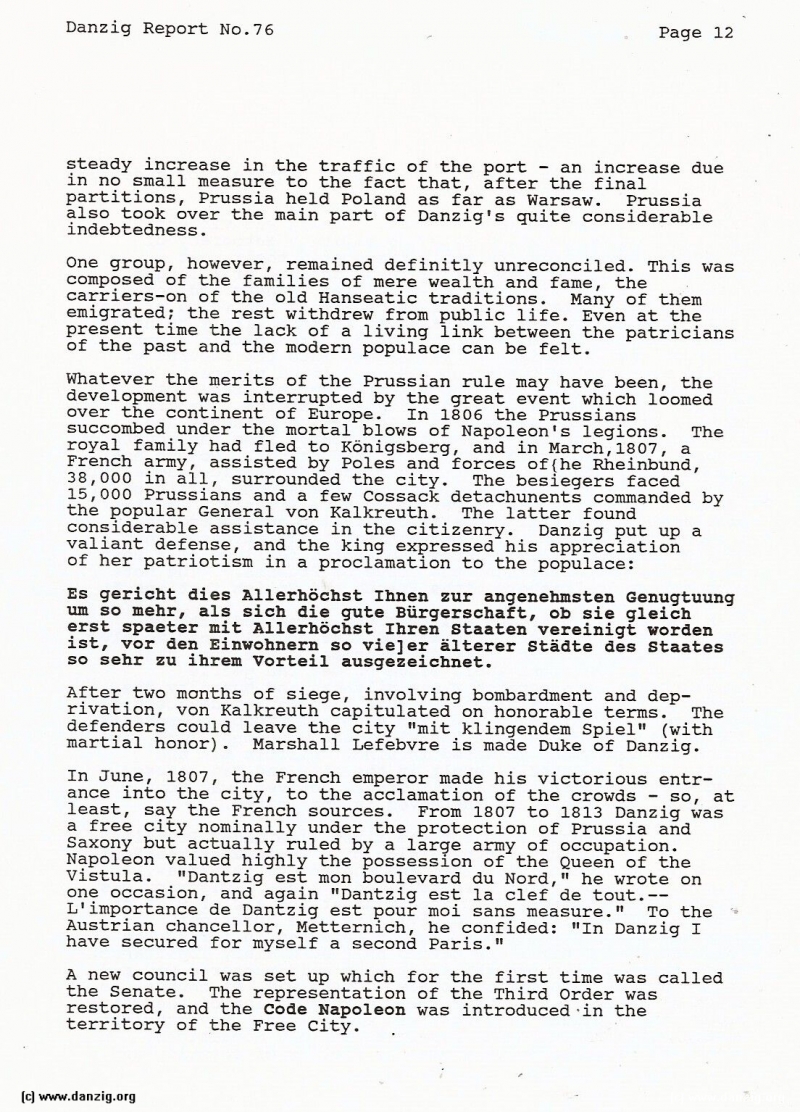
steady increase in the traffic of the port — an increase due in no small measure to the fact that, after the final partitions, Prussia held Poland as far as Warsaw. Prussia also took over the main part of Danzig’s quite considerable indebtedness.
One group, however, remained definitly unreconciled. This was composed of the families of mere wealth and fame, the carriers—on of the old Hanseatic traditions. Many of them emigrated; the rest withdrew from public life. Even at the present time the lack of a living link between the patricians of the past and the modern populace can be felt.
Whatever the merits of the Prussian rule may have been, the development was interrupted by the great event which loomed over the continent of Europe. In 1806 the Prussians succombed under the mortal blows of Napoleon’s legions. The royal family had fled to Königsberg, and in March,1807, a French army, assisted by Poles and forces of the Rheinbund, 38,000 in all, surrounded the city. The besiegers faced 15,000 Prussians and a few Cossack detachunents commanded by the popular General von Kalkreuth. The latter found considerable assistance in the citizenry. Danzig put up a valiant defense, and the king expressed his appreciation of her patriotism in a proclamation to the populace:
Es gericht dies Allerhöchst Ihnen zur angenehmsten Genugtuung urn so mehr, als sich die gute Bürgerschaft, ob sie gleich erst spaeter mit Allerhöchst Ihren Staaten vereinigt worden ist, vor den Einwohnern so vie]er älterer Städte des Staates so sehr zu ihrern Vorteil ausgezeichnet.
After two months of siege, involving bombardment and depr ivation, von Kalkreuth capitulated on honorable terms. The defenders could leave the city “mit klingendem Spiel” (with martial honor). Marshall Lefebvre is made Duke of Danzig.
In June, 1807, the French emperor made his victorious entra nce into the city, to the acclamation of the crowds — so, at least, say the French sources. From 1807 to 1813 Danzig was a free city nominally under the protection of Prussia and Saxony but actually ruled by a 1are army of occupation. Napoleon valued highly the possession of the Queen of the Vistula. “Dantzig est mon boulevard du Nord,” he wrote on one occasion, and again “Dantzig est la clef de tout.—— L’importance de Dantzig est pour moi sans measure.” To the Austrian chancellor, Metternich, he confided: “In Danzig I have secured for myself a second Paris.”
A new council was set up which for the first time was called the Senate. The representation of the Third Order was restored, and the Code Napoleon was introduced in the territory of the Free City.
Danzig Report Vol. 1 - Nr. 76 - July - August - September - 1992, Page 12.
Hits: 1538
Added: 02/07/2015
Copyright: 2024 Danzig.org

